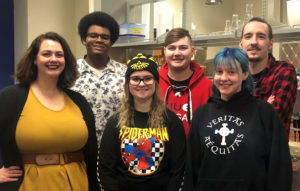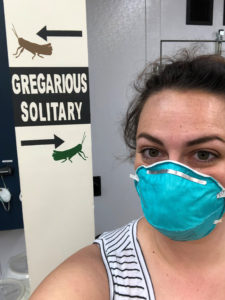Summer Research with Dr. Brittany F. Peterson

“Bug Guts Lab.”
Summer is almost over and as we prepare to usher in a new semester at Southern Illinois University Edwardsville, professors like Dr. Brittany F. Peterson in the Department of Biological Sciences will be carrying their summertime work over into the fall. Peterson’s research interests lie in attempting to understand the symbiotic interactions and adaptive traits in host organisms like termites and the relationship that they have with the bacteria in their guts. Recently, she has been working on a new study involving the characterization of locust microbiomes.
Last month, Peterson traveled to Arizona State University (ASU) to collaborate on a new project with Dr. Arianne Cease, Assistant Professor at the School of Sustainability. Cease primarily focuses her research on locust plagues and how human-plant-insect interactions affect the sustainability of agricultural systems. “Dr. Cease came to my dissertation defense and approached me about looking further into the gut microbiome of locusts,” stated Peterson. Cease started mailing locusts to Peterson back in October and ever since, she has been working to understand a series of questions about their microbiome. “Who are the core microbes across this genus? What are they doing? Why are they there?” she inquired openly. “We are still learning a lot of basic things about their biology.”

Dr. Brittany F. Peterson
At this point, a little background may be necessary to understand the broader impacts of Peterson’s research. Locusts are actually a species of short-horned grasshoppers who are typically solitary, but under certain conditions they can become gregarious and swarm, blackening the skies and decimating crops. “At some point grasshoppers switch from being solitary to becoming a gregarious locust and there seems to be a dietary component to it–we are just beginning to discover what microbes colonize the guts of grasshoppers and locusts and whether this has any role in this behavioral shift.”
Peterson spent a week in the lab at ASU culturing bacteria from these species in order to start addressing these questions and generate undergraduate research projects for students at SIUE. Her plans are to first characterize their microbiome and then compare the microbiomes of the lab raised solitary species with that of a gregarious species from the same genus. “This plasticity is really interesting from an evolutionary standpoint, but even more, it has real global importance. With a swarm like this coming through, a family’s crop can be completely decimated and anything we can do to improve our understanding of this species basic biology and ecology is a step in the right direction” (Peterson).
Among numerous other questions that Peterson is working to address, she and her Undergraduate Research and Creative Activities (URCA) assistant, Valerie Murphy, are looking at a pathogen found in the lab-reared grasshoppers that has promising potential for bio-control.
Filed Under: Biological Sciences












